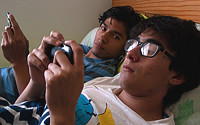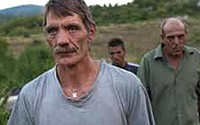| SHADOWS ON THE WALL | REVIEWS | NEWS | FESTIVAL | AWARDS | Q&A | ABOUT | TALKBACK | |||||||||||||
 Shadows off the beaten path Shadows off the beaten path | |||||||||||||
| Indies, foreigns, docs, revivals and shorts... | |||||||||||||
|
On this page:
BOY UNDONE |
GOOD MANNERS JEUNE FEMME | WESTERN < < F O R E I G N > > last update 23.May.18 See also: SHADOWS FILM FESTIVAL | |||||||||||||
 R E V I E W B Y R I C H C L I N E
R E V I E W B Y R I C H C L I N E | |||||||||||||
Boy Undone
 Memorias de lo Que No Fue Memorias de lo Que No Fue
| |||||||||||||
|
dir-scr Leopoldo Laborde; prd Roberto Trujillo with Paul Act, Eduardo Longoria, Rodrigo Lopezcarranza, Luis Fernando Schivy, Xavier Loya, Luis Montoya, Abril Ramos Xochiteotzin, Abraham Vega, Francisco Bausste, Diego Armando Lopez, Mauricio Schyvy  release US/UK 28.May.18 17/Mexico 1h43 |
 With a fiendishly involving premise, this low-fi Mexican thriller is mesmerising from the start. Filmmaker Leopoldo Laborde takes a minimalistic approach, focussing on wordless encounters and dark emotions. Even as it becomes rather graphic and as the plot develops in some rather muddled directions, the film has a dreamlike tone, exploring a relationship in unusual circumstances. So it's seriously haunting.
With a fiendishly involving premise, this low-fi Mexican thriller is mesmerising from the start. Filmmaker Leopoldo Laborde takes a minimalistic approach, focussing on wordless encounters and dark emotions. Even as it becomes rather graphic and as the plot develops in some rather muddled directions, the film has a dreamlike tone, exploring a relationship in unusual circumstances. So it's seriously haunting.
After a night of heavy partying at a nightclub, a young man (Act) wakes up in a strange house, naked, confused and unable to remember his name. He also doesn't recognise Miguel (Longoria), who emerges from the shower telling him everything will be fine. With nowhere to go, the boy sticks around, seeking clues about his identity, feeling safe with Miguel. When hazy memories begin to appear, they're a confusing swirl of sex involving two other guys and also a woman. Then on the street he spots a kid who knows his name is Fernando. Laborde, who shot and edited the film himself, cleverly uses the camera to explore the characters and their offbeat situation, never falling back on trite exposition or pushy themes, apart from a late rant about the evils of the bourgeois. For these two strangers, their physical and emotional connection has no explanation at all. Fernando doesn't know who he is, but knows what he wants. So perhaps now he doesn't hope to remember anything. But his past is coming back whether he wants it to or not. And it's genuinely unnerving. Act and Longoria bring engaging earthiness to their roles, which helps build a strong sense of chemistry between them. Act's helplessness and slow-burning panic offers a strong contrast against Longoria's short-fused self-confidence. And this is about more than just amnesia, as Miguel's experience with sex is both enticing and terrifying to Fernando. Later, costar Lopezcarranza dives into his role with the same naked commitment, shifting things in a nerve-wracking direction. The montage sequences featuring Fernando's memories of sexual encounters are so explicit that they feel like a bunch of porn movies edited together. But the underlying pathos in the premise gives the film a jolt of emotion that's difficult to define. It's an enticing idea: starting over, having a pure relationship unfettered by the past, letting go of pain and history. So it's a little frustrating when everything turns seriously creepy. This means that solving the mystery brings unexpected emotions. We can certainly identify with the desire to remain in that happy bubble. | ||||||||||||
18 themes, language, sexuality<, violencehr color="#e6e6e6">16.May.18
|
| | ||||||||||||
 R E V I E W B Y R I C H C L I N E
R E V I E W B Y R I C H C L I N E | |||||||||||||
Good Manners As Boas Maneiras As Boas Maneiras
| |||||||||||||
|
dir-scr Marco Dutra, Juliana Rojas prd Frederic Corvez, Clement Duboin, Sara Silveira with Isabel Zuaa, Marjorie Estiano, Miguel Lobo, Cida Moreira, Felipe Kenji, Nina Medeiros, Andrea Marquee, Hugo Villavicenzio, Neusa Velasco, Gilda Nomacce, Eduardo Gomes, Adriana Mendonca  release US Sep.17 ff,
release US Sep.17 ff, UK Oct.17 lff, Br 7.Jun.18 17/Brazil 2h15 
|  An extraordinary fairy tale that mixes comedy, horror and personal drama, this Brazilian film so resolutely challenges expectations that it's almost impossible to describe the plot without spoiling it. Lushly shot and acted with deep emotion, this film provokes the audience as much as it entertains, taking us on an outrageous journey that's both fantastical and properly grounded. It leaves us shaken and oddly satisfied.
An extraordinary fairy tale that mixes comedy, horror and personal drama, this Brazilian film so resolutely challenges expectations that it's almost impossible to describe the plot without spoiling it. Lushly shot and acted with deep emotion, this film provokes the audience as much as it entertains, taking us on an outrageous journey that's both fantastical and properly grounded. It leaves us shaken and oddly satisfied.
In Sao Paulo, Clara (Zuaa) applies for a job as a nanny to wealthy young Ana (Estiano), who hires her even though she has no experience. Ana is pretty hopeless, so Clara begins running her life. And as they bond in the final months of Ana's pregnancy, Clara feels like she has finally found a home. But once a month during the full moon, Ana spends four nights sleepwalking, and what she gets up to becomes increasingly disturbing for Clara. So when something unspeakably crazy happens, even Clara is surprised by what she does. The story continues seven years later, following Ana's son Joel (Lobo) as he begins to exert his independence. And nothing about his story happens as expected. Suffice it to say that the moon features heavily, as do a couple of his school friends (Kenji and Medeiros), a nutty landlady (Moreira), some emotional musical numbers, a secret room and a bag of diamonds. And despite the epic length and major shifts in tone, Filmmakers Dutra and Rojas skilfully lead the audience through the story. Within the heightened settings, Zuaa delivers a raw, earthy performance as the sardonic Clara, who instantly spots when someone is being disingenuous and calls them on it. Her interaction with both Estiano's ditzy Ana and Lobo's curious Joel conveys emotional attachment and a fierce sense of protective caution. So these relationships resonate even when they're not on-screen. And side characters all feel like outsiders, as if they aren't in on the joke. The filmmakers set this in a fantastical atmosphere, with the city's glass towers gleaming across the river like Oz in the distance. And they evoke the more outlandish elements with effects that are subtle and largely realistic. But what's most impressive is how they generate nervous laughter even when something truly horrific is happening. This is because the story's emotional core is so solid that we are just as conflicted as Clara is about what needs to be done. And what she does is, frankly, awesome. | ||||||||||||
|
15 themes, language, violence, sexuality 30.Mar.18 | |||||||||||||
 R E V I E W B Y R I C H C L I N E
R E V I E W B Y R I C H C L I N E | |||||||||||||
Jeune Femme
 aka: Montparnasse Bienvenue aka: Montparnasse Bienvenue
| |||||||||||||
|
dir-scr Leonor Serraille prd Sandra da Fonseca with Laetitia Dosch, Souleymane Seye Ndiaye, Nathalie Richard, Marie Remond, Leonie Simaga, Gregoire Monsaingeon, Lila-Rose Gilberti, Erika Sainte, Lou Valentini, Emma Benestan, Audrey Bonnet, Arnaud de Cazes  release US Oct.17 piff,
release US Oct.17 piff, Fr 1.Nov.17, UK 18.May.18 17/France 1h37 
|  With a fiercely focussed perspective, first-time writer-director Leonor Serraille creates a bracingly present-tense drama about a young woman who might not be ready to pull herself together. It's a bold, in-your-face movie that isn't always easy to watch, mainly because the central figure is such a nightmare. But it's also witty, surprising and refreshingly complicated.
With a fiercely focussed perspective, first-time writer-director Leonor Serraille creates a bracingly present-tense drama about a young woman who might not be ready to pull herself together. It's a bold, in-your-face movie that isn't always easy to watch, mainly because the central figure is such a nightmare. But it's also witty, surprising and refreshingly complicated.
Paula (Dosch) is not taking her break-up with her boyfriend of 10 years Joachim (Monsaingeon) in stride. A whirling dervish, she storms his flat, steals his cat and bombards him with messages, snapping at anyone in her way. Alienated from her mother (Richard), Paula now needs a place to live. When Yuki (Simaga) mistakes her for an old friend, she embraces it. She also gets a job as a nanny to young Lila (Gilberti), and finds additional work at a lingerie kiosk in a mall, where security guard Ousmane (Ndiaye) offers her some unpressurised friendship. Cinematographer Emilie Noblet keeps her cameras locked on Paula as she pings from one desperate situation to the next, infuriating pretty much everyone she meets. At 31, she acts more like a teenager, ranting on and on about her misery (Bonnet's doctor just listens silently). The opening scenes are essentially a long tantrum, and what follows is a stream of consciousness. Paula believes that Paris is a city that hates people, when perhaps the opposite is true. Dosch dives fully into this out-of-control diva who isn't particularly bright, refusing offers of genuine compassion or assistance. Yet despite being unlikable and inappropriate, Dosch and Serraille manage to make Paula sympathetic. Her interaction with everyone is prickly and awkward, with added tension in the superb scenes with Richard as her bitter mother. So when Ousmane appears, beautifully played by Ndiaye with a gently sardonic sense of humour, it's like a breath of fresh air, a nice guy who perhaps can tame the beast. And Monsaingeon is also startlingly concerned and loving. In other words, the film is a fascinating jumble of moods and opinions, edgy and rough but with strikingly detailed characters. Because Paula is so impulsive and exasperating, the film isn't very easy to watch. It's also hard to get a grip on. But it's packed with moments that feel like a kick to the gut. This is a woman fighting against both reason and any sense of responsibility to be herself, and in this sense the movie feels vital and relevant. And also a little scary.
15 themes, language, violence | 16.Apr.18
|
|  R E V I E W B Y R I C H C L I N E
R E V I E W B Y R I C H C L I N E
Western | 
dir-scr Valeska Grisebach | prd Maren Ade, Jonas Dornbach, Valeska Grisebach, Janine Jackowski, Michel Merkt with Meinhard Neumann, Reinhardt Wetrek, Syuleyman Alilov Letifov, Veneta Fragnova, Vyara Borisova, Kevin Bashev, Aliosman Deliev, Momchil Sinanov, Robert Gawellek, Jens Klein, Waldemar Zang, Detlef Schaich  release Ger 24.Aug.17, US 16.Feb.18, UK 13.Apr.18 17/Germany 2h01 VENICE FILM FEST TORONTO FILM FEST 
|  The title of this contemporary German drama refers to an attitude rather than the genre. And director Valeska Grisebach cleverly keeps scenes sun-drenched and dusty in a rural Bulgarian wilderness near a small village, where riding horseback is the easiest mode of transport and evenings wind down around a campfire. And over the course of this slow-burn drama, the tensions rise incrementally, hinting that there will have to be a final showdown.
The title of this contemporary German drama refers to an attitude rather than the genre. And director Valeska Grisebach cleverly keeps scenes sun-drenched and dusty in a rural Bulgarian wilderness near a small village, where riding horseback is the easiest mode of transport and evenings wind down around a campfire. And over the course of this slow-burn drama, the tensions rise incrementally, hinting that there will have to be a final showdown.
A group of German workers are constructing a hydroelectric plant in a mountainous setting. Life here is an adventure, but they clash with locals when they start picking plums, riding stray horses and flirting with women like Vyara (Borisova). Team member Meinhard (Neumann) watches this with annoyed detachment, especially the offensive behaviour of his colleague Vincent (Wetrek). So Meinhard is an outsider both in this foreign land and among his own compatriots. But he tries to befriend local official Adrian (Letifov) to soothe the tensions, teaching Adrian's nephew (Bashev) to ride a horse. Grisebach's writing and directing are razor-sharp, taking a subtle approach to a series of high-intensity encounters. Even the most meandering scene ripples with aggressive behaviour, mostly tiny insults and manipulations that go largely unremarked as these people try to exert control over each other. With a German flag flying over their accommodation, there's a sense that these visiting workers are staking a claim here. And they aren't ignorant of the nasty past between their countries, which has understandably left locals wary of interlopers. The actors all deliver gritty, earthy performances that feel sometimes startlingly authentic. This means that most of the dialog feels improvised, with the language barrier adding layers of intrigue (and witty subtitles) in encounters between Germans and Bulgarians who can't understand each others' words but know full well what the underlying meaning is. Looking like a Western hero, the lean, tall, craggy-faced Neumann has a calming presence that puts everything into perspective, mainly because he so resolutely refuses to share the narrow mindset of his chucklehead colleagues. Grisebach and cinematographer Bernhard Keller observe everything carefully, just as Meinhard does, which offers welcome glimpses of positive connections between these communities, including warm friendships and even a hint of romance. And even though the story unfolds very slowly over a rather long running time, the gradually building antagonism between these outsiders and the villagers is seriously unnerving, especially when they start wearing guns on their belts.
12 themes, language, violence | 5.Apr.18 

See also: SHADOWS FILM FESTIVAL © 2018 by Rich Cline, Shadows
on the Wall
| |||||